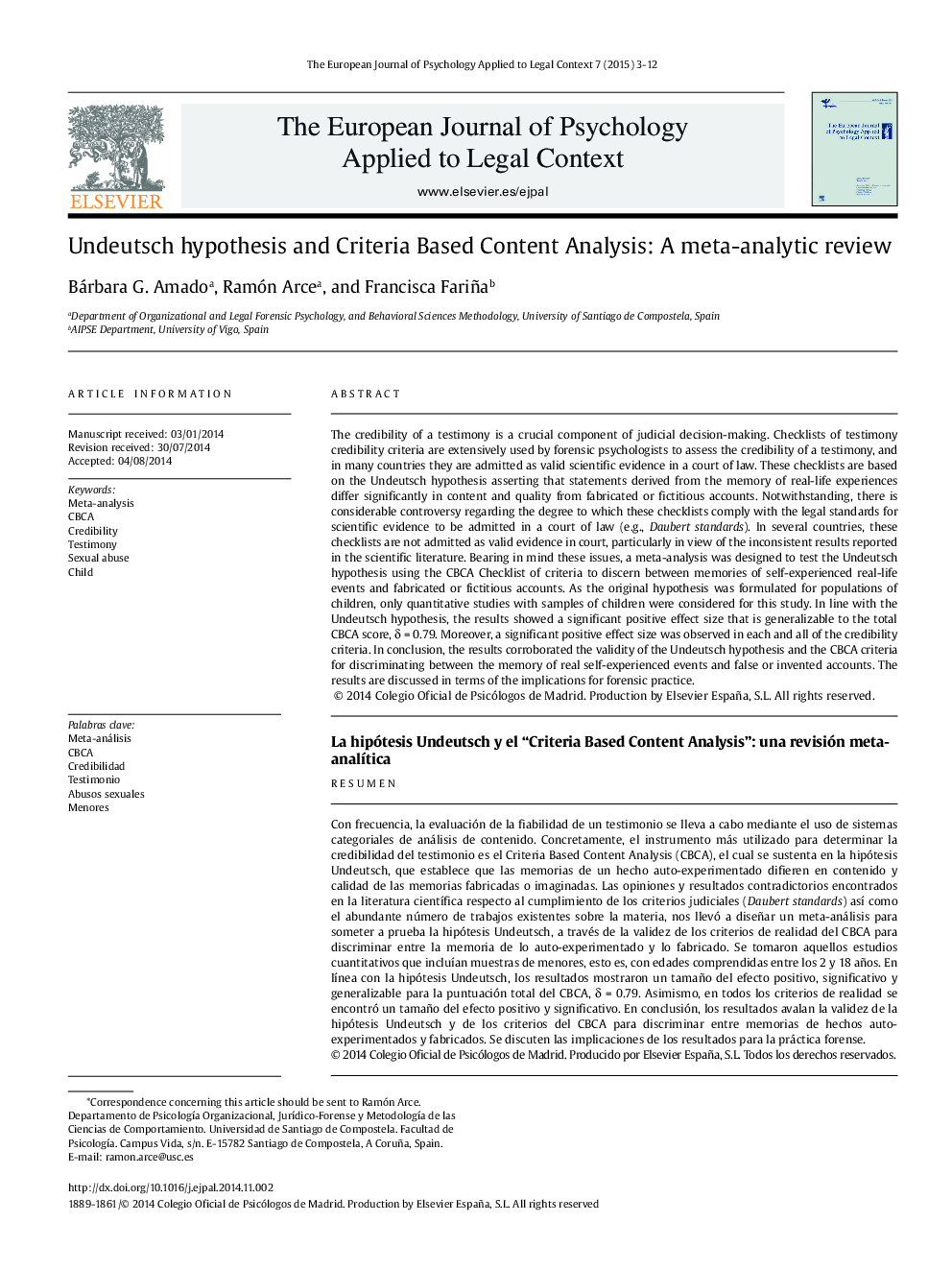| کد مقاله | کد نشریه | سال انتشار | مقاله انگلیسی | نسخه تمام متن |
|---|---|---|---|---|
| 318683 | 1432673 | 2015 | 10 صفحه PDF | دانلود رایگان |

The credibility of a testimony is a crucial component of judicial decision-making. Checklists of testimony credibility criteria are extensively used by forensic psychologists to assess the credibility of a testimony, and in many countries they are admitted as valid scientific evidence in a court of law. These checklists are based on the Undeutsch hypothesis asserting that statements derived from the memory of real-life experiences differ significantly in content and quality from fabricated or fictitious accounts. Notwithstanding, there is considerable controversy regarding the degree to which these checklists comply with the legal standards for scientific evidence to be admitted in a court of law (e.g., Daubert standards). In several countries, these checklists are not admitted as valid evidence in court, particularly in view of the inconsistent results reported in the scientific literature. Bearing in mind these issues, a meta-analysis was designed to test the Undeutsch hypothesis using the CBCA Checklist of criteria to discern between memories of self-experienced real-life events and fabricated or fictitious accounts. As the original hypothesis was formulated for populations of children, only quantitative studies with samples of children were considered for this study. In line with the Undeutsch hypothesis, the results showed a significant positive effect size that is generalizable to the total CBCA score, δ = 0.79. Moreover, a significant positive effect size was observed in each and all of the credibility criteria. In conclusion, the results corroborated the validity of the Undeutsch hypothesis and the CBCA criteria for discriminating between the memory of real self-experienced events and false or invented accounts. The results are discussed in terms of the implications for forensic practice.
ResumenCon frecuencia, la evaluación de la fiabilidad de un testimonio se lleva a cabo mediante el uso de sistemas categoriales de análisis de contenido. Concretamente, el instrumento más utilizado para determinar la credibilidad del testimonio es el Criteria Based Content Analysis (CBCA), el cual se sustenta en la hipótesis Undeutsch, que establece que las memorias de un hecho auto-experimentado difieren en contenido y calidad de las memorias fabricadas o imaginadas. Las opiniones y resultados contradictorios encontrados en la literatura científica respecto al cumplimiento de los criterios judiciales (Daubert standards) así como el abundante número de trabajos existentes sobre la materia, nos llevó a diseñar un meta-análisis para someter a prueba la hipótesis Undeutsch, a través de la validez de los criterios de realidad del CBCA para discriminar entre la memoria de lo auto-experimentado y lo fabricado. Se tomaron aquellos estudios cuantitativos que incluían muestras de menores, esto es, con edades comprendidas entre los 2 y 18 años. En línea con la hipótesis Undeutsch, los resultados mostraron un tamaño del efecto positivo, significativo y generalizable para la puntuación total del CBCA, δ = 0.79. Asimismo, en todos los criterios de realidad se encontró un tamaño del efecto positivo y significativo. En conclusión, los resultados avalan la validez de la hipótesis Undeutsch y de los criterios del CBCA para discriminar entre memorias de hechos auto-experimentados y fabricados. Se discuten las implicaciones de los resultados para la práctica forense.
Journal: The European Journal of Psychology Applied to Legal Context - Volume 7, Issue 1, January 2015, Pages 3–12